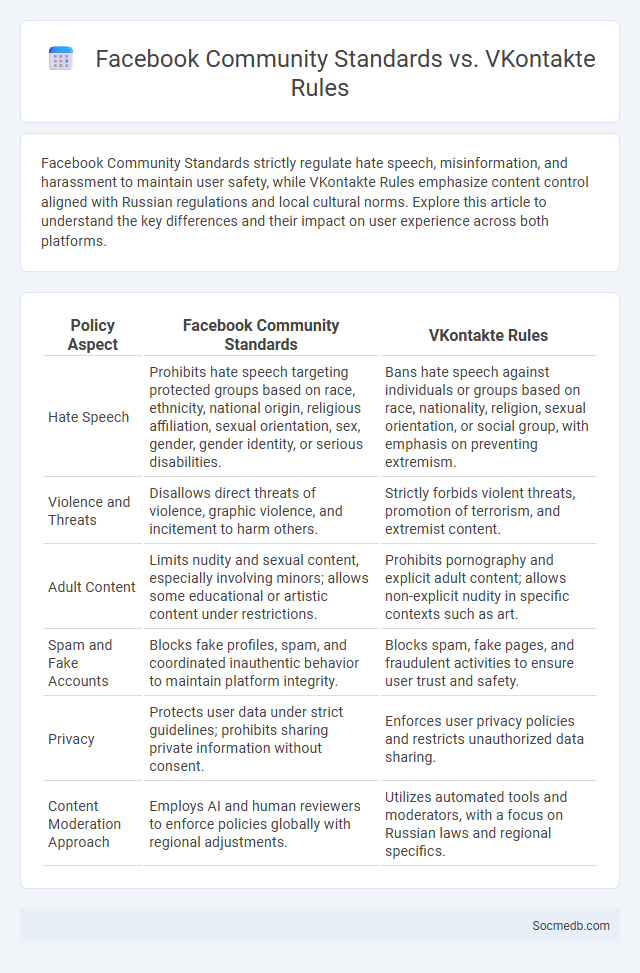
Photo illustration: Facebook Community Standards vs VKontakte Rules
Facebook Community Standards strictly regulate hate speech, misinformation, and harassment to maintain user safety, while VKontakte Rules emphasize content control aligned with Russian regulations and local cultural norms. Explore this article to understand the key differences and their impact on user experience across both platforms.
Table of Comparison
| Policy Aspect | Facebook Community Standards | VKontakte Rules |
|---|---|---|
| Hate Speech | Prohibits hate speech targeting protected groups based on race, ethnicity, national origin, religious affiliation, sexual orientation, sex, gender, gender identity, or serious disabilities. | Bans hate speech against individuals or groups based on race, nationality, religion, sexual orientation, or social group, with emphasis on preventing extremism. |
| Violence and Threats | Disallows direct threats of violence, graphic violence, and incitement to harm others. | Strictly forbids violent threats, promotion of terrorism, and extremist content. |
| Adult Content | Limits nudity and sexual content, especially involving minors; allows some educational or artistic content under restrictions. | Prohibits pornography and explicit adult content; allows non-explicit nudity in specific contexts such as art. |
| Spam and Fake Accounts | Blocks fake profiles, spam, and coordinated inauthentic behavior to maintain platform integrity. | Blocks spam, fake pages, and fraudulent activities to ensure user trust and safety. |
| Privacy | Protects user data under strict guidelines; prohibits sharing private information without consent. | Enforces user privacy policies and restricts unauthorized data sharing. |
| Content Moderation Approach | Employs AI and human reviewers to enforce policies globally with regional adjustments. | Utilizes automated tools and moderators, with a focus on Russian laws and regional specifics. |
Introduction to Social Media Community Guidelines
Social media community guidelines establish clear rules that govern user behavior, content sharing, and interactions across platforms like Facebook, Instagram, and Twitter. These guidelines prioritize user safety by addressing issues such as hate speech, harassment, misinformation, and privacy violations. Adhering to these policies helps maintain a respectful and secure online environment for millions of users worldwide.
Overview of Facebook Community Standards
Facebook Community Standards outline rules designed to foster safe and respectful interactions across the platform, prohibiting hate speech, harassment, and misinformation. These standards emphasize protecting user privacy, preventing violence and harmful content, and promoting authentic behavior to cultivate trust within online communities. Your compliance with these guidelines ensures a positive experience and helps maintain a supportive environment for all users.
VKontakte Rules: A Brief Summary
VKontakte's rules prioritize user safety by prohibiting hate speech, harassment, and the sharing of illegal content, ensuring a respectful community atmosphere. Your content must comply with these guidelines to avoid account suspension or removal of posts. Adhering to VKontakte's policies protects your online presence and promotes responsible social media use.
Comparing Core Values: Facebook vs VKontakte
Facebook emphasizes global connectivity, prioritizing user engagement through personalized news feeds and targeted advertising to maximize social interaction and business reach. VKontakte focuses on community building within Russian-speaking regions, offering extensive multimedia sharing options and integrated music streaming to enhance social experiences. Both platforms value user privacy and content moderation but differ in cultural adaptation and feature prioritization tailored to their dominant audiences.
Content Moderation Approaches
Content moderation approaches on social media platforms include automated algorithms that detect and remove harmful or inappropriate content based on predefined criteria, ensuring compliance with community standards. Human moderators review flagged content to provide nuanced judgment and context-sensitive decisions, addressing cases where AI may fall short. Your online experience is safeguarded through a combination of these strategies, promoting a safer and more respectful digital environment.
Freedom of Expression vs Content Restrictions
Social media platforms balance freedom of expression with content restrictions by enforcing community guidelines designed to prevent hate speech, misinformation, and harmful content while enabling users to share diverse opinions. Algorithms and moderation policies impact how content is filtered or promoted, influencing public discourse and raising debates over censorship and user rights. Transparency in moderation practices and appeals processes remains critical to maintaining trust and protecting democratic values on digital platforms.
Handling Hate Speech and Misinformation
Handling hate speech and misinformation on social media requires advanced algorithms and human moderation to detect and remove harmful content promptly. Platforms implement community guidelines and fact-checking systems that empower users to report violations and verify information accuracy. Protecting your online experience depends on continuous updates to these measures, ensuring a safer and more trustworthy digital environment.
User Privacy and Data Protection Policies
User privacy and data protection policies are critical components of social media platforms, designed to safeguard personal information and maintain user trust. These policies regulate data collection, storage, and sharing practices, ensuring compliance with regulations like GDPR and CCPA. You should regularly review privacy settings and updates to control how your data is used and shared on these platforms.
Local Laws and Cultural Influences
Social media platforms must navigate a complex landscape of local laws and cultural influences that shape content regulations, user behavior, and advertising standards worldwide. Compliance with region-specific data privacy laws like the GDPR in Europe or the CCPA in California is critical for operating legally and maintaining user trust. Cultural norms influence platform moderation policies, content acceptability, and marketing strategies, requiring tailored approaches in diverse markets to ensure relevance and effectiveness.
Conclusion: Key Differences and Implications
Social media platforms differ significantly in user demographics, content formats, and engagement algorithms, shaping how individuals and businesses interact online. These variations impact brand visibility, audience targeting, and overall marketing strategies, making platform-specific approaches essential for success. Understanding these distinctions enables more effective communication, higher engagement rates, and improved return on investment in digital campaigns.
 socmedb.com
socmedb.com